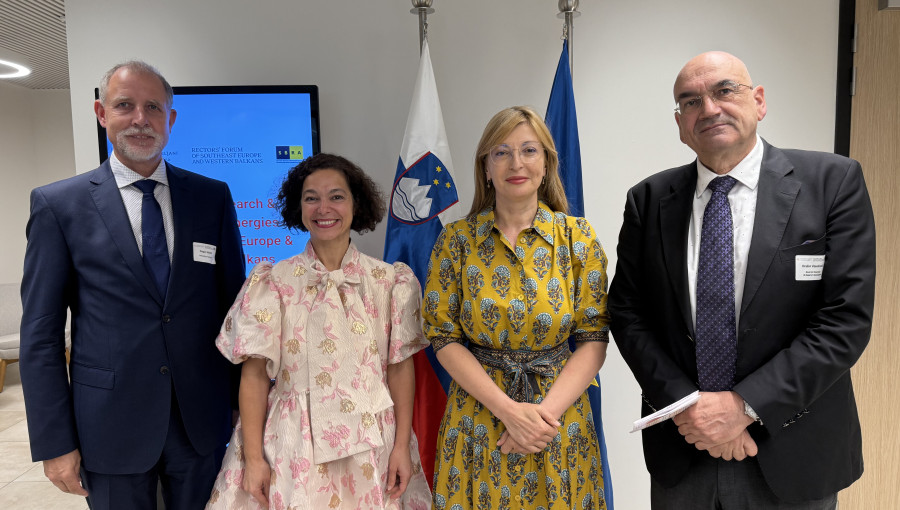University of Ljubljana, Rectors' Forum of Southeast Europe and Western Balkans, and SBRA: Academic integration as a key factor for development

European Commissioner for Research and Innovation, Ekaterina Zaharieva, and the Rector of the University of Ljubljana, prof. Dr Gregor Majdič. Photo:
Date of publication:
On Thursday, 12 June, the University of Ljubljana, in cooperation with the Brussels-based Slovenian Business and Research Association (SBRA) and the Rectors' Forum of Southeast Europe and Western Balkans, organised a consultation on academic integration in the Western Balkans, with a focus on the integration of candidate countries into the European Union. Ekaterina Zaharieva, European Commissioner for Startups, Research and Innovation, attended the event and was among the keynote speakers.
In her address, the Commissioner praised the work of the Western Balkans Rectors' Forum and highlighted the crucial role of academic networking in the region. She emphasised that the European Union will continue to provide strong support for research across Europe through programmes such as the ERC, Marie Skłodowska-Curie Actions and Horizon Europe, which will remain stand-alone instruments in the upcoming financial period. In this context, she pointed out the importance of adequate national research funding, noting that the most successful countries in the aforementioned European programmes are those that invest most heavily in research and development. With regard to Europe's competitiveness, she noted that while Europe produces world-class research, it is often not applied effectively in society or the economy. The key challenge, therefore, remains to boost innovation and encourage greater investment in development by the business sector, which must play a more active role in turning knowledge into practical applications.
Academic integration plays a key role in international cooperation and contributes to development at both the national and international levels. In addition to collaborating with leading European universities, the University of Ljubljana also considers it part of its mission to strengthen ties with institutions in the Western Balkans and to support the development of higher education systems in the candidate countries, particularly in light of their aspirations for EU membership. As part of these efforts, the University of Ljubljana actively participates in the Rectors' Forum of Southeast Europe and Western Balkans, which promotes academic networking, exchange of experience, staff and student mobility, and thereby contributes to the gradual rapprochement of the region’s countries with the European Union.
The consultation, held at the Slovenian Representation in Brussels, aimed to explore various aspects of cooperation in the fields of higher education and research. Participants were presented with the achievements and ongoing activities of the Rectors' Forum of Southeast Europe and Western Balkans, and the Rector of the University of Belgrade provided an overview of the current situation in Serbia, particularly in light of the student protests. The event also featured two round tables – one addressing the general aspects of regional cooperation, and the other focusing on legislative frameworks and quality assurance in higher education, with a comparison between EU Member States and candidate countries.
“Events like today's are of great importance for the future of the region. Bringing academia and business together is not just a strategic decision, but a necessity if we are to create sustainable solutions to common challenges. Only through shared knowledge, the exchange of experience and open dialogue can we contribute to the development of society as a whole – both in the Member States and in the candidate countries," emphasised the Rector of the University of Ljubljana, Prof. Dr Gregor Majdič.

